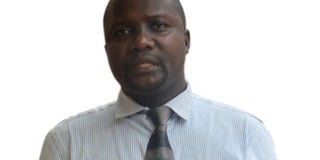Counsellor Ali is driven by empathy

Ali Male has been the spokesperson Uganda Counselling Association since 2014
What you need to know:
THE KNIGHT. Ali Male has been the spokesperson Uganda Counselling Association since 2014. He spoke to Godfrey Lugaaju about his profession.
Tell me briefly about yourself
I am a counselling psychologist aged 38. I’m an extrovert, open minded and driven by the values of justice and equality. I am also very principled.
What does your job entail?
Being an advocate for professional counselling in Uganda and ensuring that all Ugandans deal with psychosocial challenges through authentic counselling. I mobilise professional counsellors to carry out crisis intervention in form of pro bono counselling for traumatised people. I also ensure that the profession has a good image through alerting police and other arms of the law about any quacks in the profession. I also have to conduct press interviews.
How long have you done counselling work?
I started doing counselling in 2004. It is close to 17 years now.
What do you like most about your job?
I like the fact that I get to help people to reach a proactive turning point of logical decision making which is vital for any person trying to live a comfortable life.
What does it take to be a good counsellor?
I think one must be mature emotionally, spiritually, physically and mentally. It also calls for one to be an active listener by understanding people’s inner world. You must be an effective communicator, professionally trained to deliver therapy.
Was counselling your dream job while growing up?
Not really, my dream was to be a lawyer but I started my career byeducating young ones in school.hile in school I realised that there are many problems school children go through that remain unresolved. I took this path with the desire to solve these.
Is there anything else you do apart from your job as a counsellor?
I’m a part time lecturer and trainer in higher institutions of learningsuch as The Institute of Advanced Leadership in Nsambya, Career Institute and at Young Women’s Christian Association (YWCA). I am also a motivational speaker and a farmer.
How do you balance these?
I use the principle of time management, schedule allocation and delegation.
Are Ugandans keen on counselling?
Yes, there are some Ugandans who understand the concept, but many do not because of the belief in self-therapy and the fear to disclose problems. Failure to have full government support is also making the profession lag behind.
On average, how many clients do you see in a month?
On average 30 clients. The different cases that are becoming common in these sessions rotate around marital and family issues. Communication problems, personality disorders, failure to respect family values and principals are also evident. Most of the cases I get are through schools but I end up interacting with the families of these students who I discover are the root cause. Marital and family problems are on the rise.
Take me through your career journey
After my A’ Level In 1999, I enrolled for a diploma in Education which I completed in 2002. I started teaching in secondary schools and then attained my bachelor’s degree in counselling at Kyambogo University in 2007. I am now doing an online Master’s degree in Counselling Psychology in Australia. I also have many certificates from trainings by Uganda Counselling Association.
What are some of the challenges in this counselling profession?
The slow movement of the Counselling Act of Parliament to regulate the profession. It is this that will be able to streamline the different fields of counselling so that everyone in the country can benefit. If Parliament can quicken up this Act, it would ease enforcement of regulations thus it will be easy to deal with the quacks in the field who ruin the credibility of the professionals.
Many untrained people are also using counselling to harm people. The amount paid for our services is also low on some projects.
How do women fare in this field?
Everywhere you go, you will find women in serious positions. On different scenarios, you find that women address issues quite well, they have been at the forefront of counselling in Uganda. However, some women in the profession need to achieve a high level of personal growth to do much better.
Who counsels you in case you need a counsellor?
I have many counsellors, some are my students with whom I share traumatising issues.
Do you take their advice?
Yes, after thorough analysis.
What do you always look out for in a woman for a relationship?
Understanding, good faith, developmental and one who can help me achieve personal growth.
Tell me about your background?
Born to one late Hajj Ali Male Musuuza and Nakiwala Safina, I grew up in a polygamous family with step mothers. My father was restrictive; something that shaped my discipline in a family that fundamentally emphasises oneness of the creator.
What are some of the tips of being a good counsellor?
Patience, humility, being able to speak the truth and having balanced religious convictions. One should also be a continuous learner, open minded and care to grow.
What advice do you give to prospective Counsellors?
Do a psychological personal reflection to clean up your psychosocial world .Before you help others you need to check yourself and heal.
To what extent does a Counselor’s private life affect his/her performance?
Sometimes in family sessions, as children tell you confidential information, parents probe you for the findings something that affects the principle of confidentiality. If the privacy is not kept as should be, clients will not trust you, so you need to maintain this.




